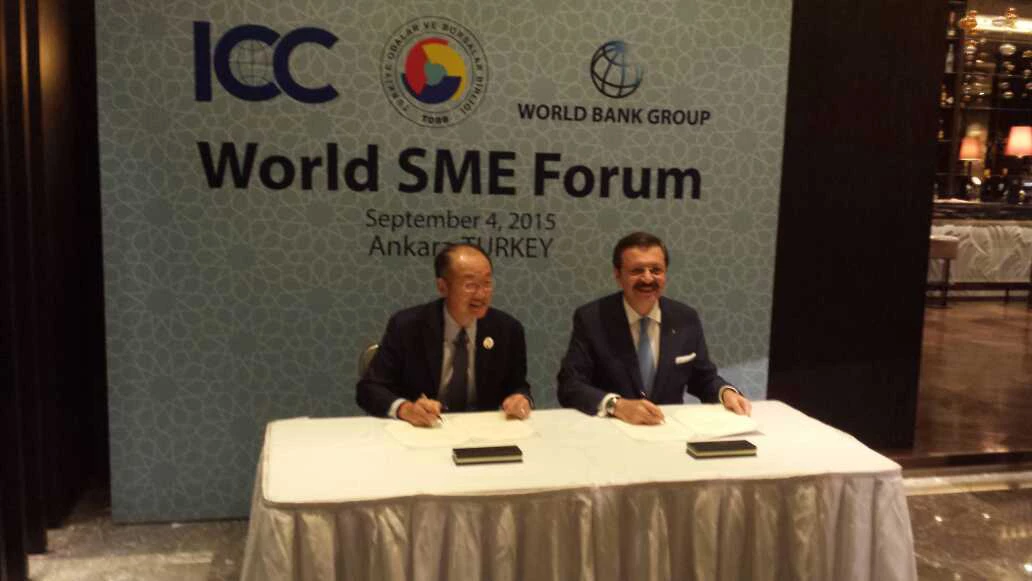The urgent challenge of generating jobs and incomes – as the world’s working-age population is poised to soar – will require making the most of all the job-creating energies of the private sector and the strategy-setting skill of the public sector. Today in Ankara, Turkey, the World Bank Group renewed its commitment to strengthen the global economy’s most promising and inclusive source of job creation: small and medium-sized enterprises (SMEs).
At a signing ceremony at the B20 conference of global business leaders – coinciding with the G20 forum of government leaders from the world’s largest economies – the Bank Group joined in a partnership with a new organization promoted by the B20: the World SME Forum (WSF), which is to become the global platform to coordinate practical assistance and policy support for SMEs.
Based in İstanbul, WSF has been founded through a partnership between the Union of Chambers and Commodity Exchanges of Turkey (TOBB), the International Chamber of Commerce (ICC), and ICC’s World Chambers Federation.
World Bank Group President Jim Yong Kim – in Ankara, Turkey, on September 4, 2015 – signs a Memorandum of Understanding to confirm the Bank Group's partnership with the World SME Forum. Also signing the document, along with President Kim, is Rifat Hisarciklioglu, the Chairman of B20 Turkey and the President of TOBB (the Union of Chambers and Commodity Exchanges of Turkey).
SMEs are a vital engine of innovation and entrepreneurship, and the success of the SME sector is central to every country’s prospects for job creation and economic growth. Providing support for SMEs is a fundamental priority for the World Bank Group, as we pursue our global goals of eradicating extreme poverty by the year 2030 and boosting shared prosperity.
SMEs are crucial to every economy: They provide as much as two-thirds of all employment, according to a recent survey of 104 countries – and, in the 85 countries that showed positive net job creation, the smallest-size enterprises accounted for more than half of total net new jobs.
However: As a recent B20 policy paper has outlined: The growth of SMEs – more so than large firms – is hampered by many challenges. Those restraints are concentrated in two broad areas – and they are especially troublesome for developing countries.
First: The SME sector – broadly speaking – often suffers from a lack of workforce skills and managerial capacity; a lower ability to innovate and adopt new technologies; limited access to finance; and a lack of capacity to comply with standards, certifications and international quality controls. SMEs need help in boosting their productivity if they hope to be successful in international markets and global value chains.
Second: The external environment in which firms operate is often difficult for SMEs. In many countries, they’re hobbled by a poor investment climate; weak enabling institutions; underdeveloped innovation ecosystems; limited access to intermediate inputs and supporting physical infrastructure; and institutional or policy constraints that restrict access to markets, networks, and opportunities.
Helping SMEs in developing countries overcome such challenges is a major priority for the Bank Group, which commits about $3 billion each year in this area. Our new partnership with the World SME Forum will reinforce this commitment.
The Bank Group is especially focused on providing targeted support in four high-priority areas:
First: fostering “high-growth entrepreneurs” – a subset among growth-oriented firms that can innovate, scale up and create value. They’re especially important, because they can provide outsized employment and growth returns.
Second: integrating SMEs into value chains, both regional and global. This kind of integration gives firms access to new markets, technology, experience knowledge, networks, and capital. Unfortunately, in many developing countries, SMEs’ involvement in these production networks is hindered by their small size and lack of familiarity with international standards and more rigorous client demands. So we’re helping build SMEs’ ability to compete in global markets and move to higher-value-added functions.
Third: strengthening women-led SMEs. Nearly one billion women worldwide have the potential to contribute even more to their economies. Yet as the Bank Group publication “Women, Business and the Law” has analyzed in detail, women’s economic potential is constrained by many financial, social, legal and regulatory factors. As outlined in the fourth edition of the report, which will be published on September 9: Empowering female entrepreneurs – especially in high-growth sectors – offers strong potential to create jobs, increase incomes and lift households out of poverty.
Fourth and finally: supporting innovation ecosystems. By harnessing technology and digital innovations for SMEs, a thriving innovation ecosystem contributes to the development of the knowledge economy – with all the high-level skills, products and processes that delivers. This is an area of special opportunity for SMEs, which can take advantage of lower costs, better information and stronger efficiencies.
The 2015 Turkish Presidency of the G20 – and the Turkish chairmanship of the B20 – has provided an opportunity to strengthen the voice of SMEs. By working together to help SMEs achieve sustainable gains in productivity and competitiveness, we can help magnify SMEs’ contributions to growth, jobs and development.


Join the Conversation